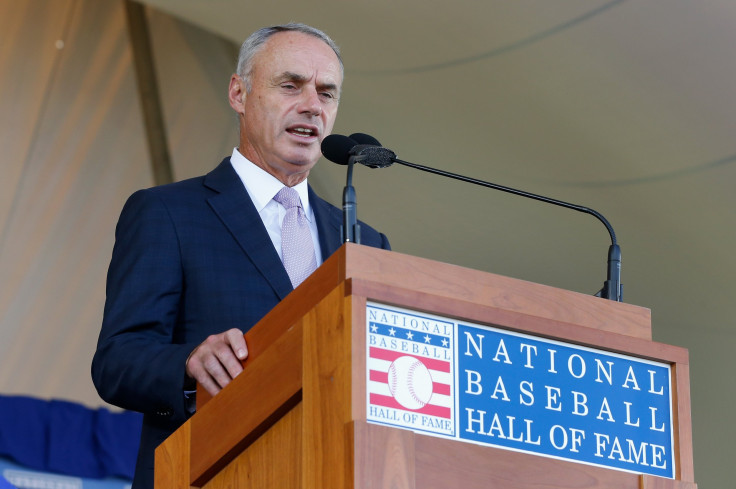Will MLB Return In 2020? Changes To Schedule, Games, Standings Considered Amid Coronavirus Pandemic

The coronavirus pandemic has effectively put all professional sports in the United States of America on hold. That includes Major League Baseball, which was supposed to have it’s league-wide Opening Day on March 26.
MLB canceled the remainder of spring training and postponed the start of the 2020 regular season indefinitely on March 12, one day after NBA All-Star Rudy Gobert tested positive for COVID-19.
Commissioner Rob Manfred and the players continue to search for ways to safely play games. It’s becoming increasingly clear that if there is baseball this year–which is still uncertain–it won’t resemble a traditional MLB season.
ESPN’s Jeff Passan reported on April 6 that MLB is exploring a potential plan that would allow the season to start in May with all 30 teams playing in Arizona. The Arizona Diamondbacks' Chase Field, 10 spring training facilities and possibly other fields would host games. Players, coaches and other personnel would have to be isolated in hotels when they aren’t at the ballpark.
A few days later, USA Today reported another proposal that would allow teams to play regular-season games at their respective spring training facilities in Arizona and Florida. Doing so would eliminate the American League and National League divisions, creating new divisions based on the spring-training sites of the teams.
Both plans would call for games to be played in empty stadiums. Nothing is close to being agreed upon.
“The whole idea of playing without fans is very hard to accomplish. Playing without fans means players are going to have to take very serious pay cuts,” a baseball source told NBC News. “If I’m a guy a year out from free agency, am I going to do that? Probably not. And be isolated from my family?”
The report indicates that the plan to split the season between Arizona and Florida facilities was only “broached briefly.” An MLB Players Association source noted that the Arizona plan described by ESPN had not yet been embraced by the union.
According to The Athletic, MLB and the players’ union haven’t talked about the plan to start the season in Arizona since it was first discussed over a week ago.
Passan said on “Get Up” Monday morning that it seems like if MLB doesn’t go forward with the Arizona plan, there won’t be a season at all. The hope would be that each team could eventually start playing games at their home stadiums after two or three months of isolation in Arizona.
MLB continues to mull over the proper time and place to return. But behind the scenes, officials are brainstorming about how to present the game better if and when they do. Empty stadiums could provide a canvas for the league to showcase baseball on TV in a completely novel way. pic.twitter.com/JfSW85KaW0
— Jeff Passan (@JeffPassan) April 14, 2020
“The only decision we have made, the only real plan that we have, is that baseball is not going to return until the public health situation is improved to the point that we’re comfortable that we can play games in a manner that is safe for our players, our employees, our fans and in a way that will not impact the public health situation adversely," Manfred said on Fox Business’ “Mornings with Maria” Tuesday morning.
“Right now, it’s largely a waiting game. During that period, as you might expect any business would, we have engaged in contingency planning. We thought about how we might be able to return in various scenarios but again the key is the improvement in the public health situation.”
Even in a best-case scenario, a regular 162-game schedule is likely no longer a possibility. MLB will have to get creative in order to play enough games to have a representative season.
Maybe that means playing seven-inning doubleheaders, an idea Manfred hasn’t completely ruled out.
“I have said publicly before that there’s some numbers in baseball you can't change. Nine innings is one of them,” Manfred said on “SportsCenter” on March 25. “When I said that, I wasn't thinking about this particular crisis. So I'm sure it's something that will get some discussion.”
The MLB schedule has been altered in the past, though likely not to the degree in which it would change this year.
The 1981 season was the shortest in modern MLB history as a mid-season players’ strike forced teams to play an average of 106 games. The 2001 World Series didn’t conclude until Nov. 4 because the Sept. 11 terrorist attacks halted play for a week.
“From our perspective, we don’t have a plan, we have lots of ideas,” Manfred said Tuesday. “What ideas come to fruition will depend on what the restrictions are, what the public health situation is. But we are intent on the idea of trying to make baseball part of the recovery–the economic recovery–and sort of a milestone on the return of normalcy.”
© Copyright IBTimes 2024. All rights reserved.






















